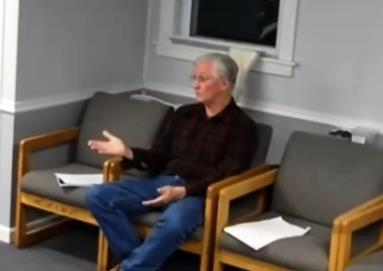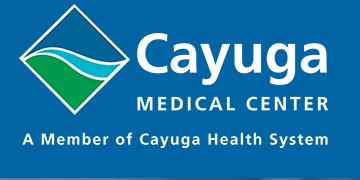Newfield legislator would also zero-out CMC’s big request
by Robert Lynch, December 16, 2022
The proposed expansion of a homeless encampment in Newfield has quickly become a flashpoint as Tompkins County legislators prepare to take testimony within days and then vote on disbursing $6.5 Million to scores of applicants under its federally-supported Community Recovery Fund.

Following a unanimous December 8th vote by the Newfield Town Board stating its firm opposition, County legislator Randy Brown advanced a Resolution this week and put it on his Legislature’s December 20th agenda that would pull a $510,000 Recovery Fund grant to Second Wind Campsites from the program’s overall funding package. Brown would delete the money despite a legislative committee’s strong support for the Second Wind proposal earlier this month.
“I’m not against the idea to figure out how to deal with crime and homelessness,” Brown told the Enfield Town Board Wednesday during his monthly legislative report. “But moving it to Newfield is not desired by us, and it’s a low-barrier encampment, which means anything goes.”
Brown told the Enfield Board he’ll also seek to strip away the costliest funding award of them all. The Newfield legislator would delete a committee-supported, $1.5 Million request by Cayuga Medical Center (CMC) that would assist the hospital in building an “Intensive Crisis Stabilization Center.” CMC says the center would provide “mental health and substance use crisis support.”
Brown would like the Legislature to redirect the money saved by eliminating both the Second Wind and CMC requests and use it to help Enfield funding applicants. Currently no Enfield applicant stands among those the committee has proposed the Legislature to fund. Brown said he plans to seek funding for two of the Enfield applicants at next Tuesday’s meeting, though he did not specify which ones.
As proposed, the Second Wind Campsites project would add “25 temporary campsite shelters” to Second Wind Cottages’ existing cluster of 18, small, temporary houses for homeless men. The cottages are located off Route 13 north of the Newfield hamlet. According to the applicant’s grant proposal, Second Wind would use the half-million dollars in Recovery funding to build the campsites, connect them to power and public water, and construct a shared services facility that would include “bathrooms, showers, laundry, pantry and storage, and a dog park.”
Of the 54 eligible applicants that cleared the second of two rounds of consultant-guided review by the six-member legislative Advisory Committee December 5th, the Second Wind proposal ranked third highest, gaining support from all six on the committee. After committee members tinkered with the numbers, the recommended grant dropped $56,000 lower than what the agency had first requested.
But only after the Community Recovery Fund Advisory Committee made its recommendation did the Newfield Town Board and legislator Brown weigh in. And what now drives their opposition is the underlying perception that Second Wind’s expansion reflects an effort by the City of Ithaca to offload its homeless crisis onto an outlying rural community that possesses neither the infrastructure nor the emergency services to handle vulnerable, unhoused populations.
In a critical two-page letter that formed the basis for the Newfield Town Board’s Resolution against Recovery Fund support for Second Wind, Newfield Supervisor Michael Allinger wrote December 6th—and read his letter that night before the Legislature—that it’s “not by coincidence” that the Second Wind proposal “was identical in nature” to the Ithaca Dedicated Encampment Site plan, better known as the TIDES proposal, one that would construct homeless housing in “The Jungle,” the unkempt land behind the Ithaca Wal-Mart. Allinger’s letter noted that Second Wind’s founder, Carmine Guidi, is also a member of the TIDES group and is also a “contributor” to the Ithaca proposal.
But Newfield is not Ithaca, Allinger, Brown, and the Newfield Board all insist. And the stark differences, they argue, make an Ithaca-style encampment out of place in their more remote, rural town.
The Newfield Supervisor points out that for starters, the proposed Second Wind cottages would set a “low barrier” entry standard for the men they invite. Allinger equates “low barrier” to near open admissions.

“Typically the homeless are struggling to overcome addiction whether substance abuse or behavioral in nature,” Allinger wrote the County Legislature. “Often homeless people are registered sex offenders, a group that particularly has challenges obtaining housing,” the Supervisor said.
And whereas Ithaca has its own police force, as well as nearby ambulances to rush overdosed addicts to the hospital, Newfield, its Town Board says, is much different.
“The Town of Newfield does not have a local police force or local emergency medical units,” the Newfield Board’s December 8th Resolution took note. “The Town of Newfield currently has among the longest response times for emergency medical response and police response in Tompkins County,” the Resolution continued.
Moreover, the Board stated, “The Town of Newfield has not been consulted or involved in any planning for an expansion of Second Winds to include low-barrier housing, and the proposed expansion therefore appears to endanger both current residents of Newfield and prospective residents of the proposed campsite shelters.”
“Moving it out to Newfield didn’t make sense to us,” Brown told the Enfield Town Board Wednesday, “because we have no services and we have long response times.”
“Homelessness is a problem that is County wide and requires a solution that is County wide,” Allinger wrote the Legislature. Furthermore, he concluded, “I don’t believe that the County should provide funding to a project proposal by an organization, albeit successful, that might be unwelcome by the people who live and work in that community. Just because we can do something doesn’t mean that we should.”
****
If, instead, the Legislature cut out the $1.5 Million committee-recommended funding for Cayuga Medical Center, it would save far more money for those other Recovery Fund applicants now finding themselves out of contention. Eliminating the CMC grant would reap for those that failed the committee’s cut—including Enfield’s applicants—three times as much money as would subtracting the Second Wind stipend. Brown told the Enfield Board it’s not that the hospital’s proposed Crisis Stabilization Unit isn’t a worthy venture. It’s just that CMC has so many other funding sources to tap and that its Recovery Fund application would eat up 23 per cent of the available cash.

“I look at the whole picture,” Brown told the Enfield Board. “Cayuga Medical has over $130 Million in cash, mutual funds, and securities and investments. And they paid their CEO $4.9 Million in 2018 and $3.9 Million in 2019.” (Brown said he couldn’t find more recent pay data.) “To give them that kind of money, it’s a systemic problem for me.”
Unlike many of the Recovery Fund applicants, Cayuga Medical Center insisted it needed the full $1.5 Million grant to proceed with its plans. It declined to accept any reduced amount. Advisory Committee members made half-hearted attempts at prior meetings to coax CMC into compromise. It never worked.
And while one of Enfield’s struggling applicants, Enfield Food Distribution, first sought a slightly larger total amount than CMC did—$1.66 Million toward construction of a new Enfield Food Pantry—Enfield Food Distribution told the committee it would accept nearly 30 per cent less than its maximum amount, or only $1.2 Million. CMC, on the other hand, refused to budge.
Addressing the Enfield Town Board Wednesday night, Randy Brown leveled more criticism against the hospital giant and against the paperwork it tendered.
“It’s a poor application. It’s not well put together,” Brown said of the hospital’s funding submission. He faulted CMC grant writers for leaning too heavily on the hospital’s lofty reputation and cavalierly brushing aside documentation required from lesser-stature applicants.
“They have money. $130 Million; I mean, My God!” Brown said of CMC’s wealth.
His critique of the hospital to the Enfield Town Board wasn’t over. “And has anybody here experienced their emergency room? Good luck with that. Work on that first!” Brown claimed constituents have called him after waiting five or six hours at CMC’s E.R. for treatment.
The legislator told the Enfield Board he was “frustrated” that none of the six Enfield-based applications tendered to the Recovery Fund consultants received committee approval so they could advance to the full Legislature. “I feel they gave way too much power to the committee,” the Newfield legislator told the Board.
Given the more than 200 applications submitted by businesses, non-profit agencies and governments countywide, and the $34 Million in funding applicants had requested, the Advisory Committee forced itself in its deliberations to reject four requested dollars for every one dollar it recommended. But it was whom the committee has chosen to endorse and reject that’s most rankled those both in an out of County government.
Among Enfield applicants, only the Enfield Community Council’s $206,000 request for a “Mental Health and Community Services” addition to its Community Building had survived the first-round cut. But when committee members got down to parceling out limited money in their second funding round, the ECC proposal fell off the cliff, falling only five spaces below the line where the committee’s money ran out.
During the first-round triage, Enfield Food Distribution’s application secured only two supportive votes out of the six votes cast. The Enfield Volunteer Fire Company’s $186,000 request for a variety of capital improvements failed in a three-three tie. A trio of Town of Enfield applications did even worse.
How the more than 50 committee-recommended funding requests will fare before the full Legislature Tuesday waits to be determined. Because of an uncompleted environmental review, the Second Wind funding will not be in the package placed on legislators’ desks that night. It would be left for a later meeting, unless Randy Brown’s Resolution kills it first. Legislative leaders expect a packed house Tuesday, with hours of advocacy from the floor, followed by legislative debate that may last longer still. Too much talking will push a final funding decision into January.
Perhaps, in the end, the best advice comes from an email to this Councilperson sent months ago, advice Enfield Fire Company President Dennis Hubbell later laid claim to. Commenting on his Town’s own, much smaller appropriation from Washington’s American Rescue Plan, Hubbell wrote, “I think the Town Board is going to wish that they put that (money) in the center of town and burned it.”
Fighting over free money can be hard.
###

